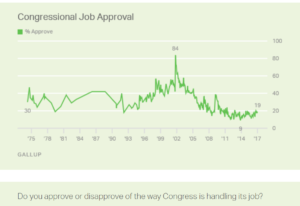- Citizens must trust their government if they are to invest it with responsibility.
- Trust between citizens is a good measure of civic capacity.
- Trust in institutions is a requirement for collaboration.
After the last few days, it seems obvious that we are headed for an alternative set of arrangements where a less trusting press and a less trusted Executive Branch part ways. I have a hard time seeing the upside of this divorce for progressive goals: since government needs trust to accomplish a lot of its goals, citizens with good reason to mistrust their government are very likely to respond by handing that government less responsibility. That will frustrate populists but not laissez-faire elites. Thus, less trust seems to be likely to increase the uptake of libertarian and neo-liberal ideas.
In some ways that’s the best case scenario: incompetence also lends itself to side deals and rent-seeking. We can end up with the minimal state via incompetence quite easily, but we could also keep the larger state but replace its technocratic reasons with pure regulatory capture and clientism. Think Tammany Hall or Mexico’s Partido Revolucionario Institucional.
 Yet mistrust did not begin recently. Except for a brief moment of post-9/11 patriotism, the US Congress has rarely been very popular in the modern era. Meanwhile, other indicators of mutual trust among citizens that have recently been quite low are on the rise, like those charted by Robert Putnam and the National Conference on Citizenship, which found in 2010 that in 2008 and 2009 only 46% of Americans talk with their neighbors and only 35% of Americans participate in community groups and organizations. Yet that number is on the rise: a follow-up study for the year 2011 found that 65.1% of Americans did favors or helped out their neighbors, and 44.1% of Americans were active in civic, religious, or school groups.
Yet mistrust did not begin recently. Except for a brief moment of post-9/11 patriotism, the US Congress has rarely been very popular in the modern era. Meanwhile, other indicators of mutual trust among citizens that have recently been quite low are on the rise, like those charted by Robert Putnam and the National Conference on Citizenship, which found in 2010 that in 2008 and 2009 only 46% of Americans talk with their neighbors and only 35% of Americans participate in community groups and organizations. Yet that number is on the rise: a follow-up study for the year 2011 found that 65.1% of Americans did favors or helped out their neighbors, and 44.1% of Americans were active in civic, religious, or school groups.
I would be remiss if I did not point out at that the Women’s Marches on Washington and elsewhere in the US brought out more than 1% of Americans. That’s a mass movement by any standard, to have so many women and men marching on a single day. Every indication is that this was the largest organized protest in the history of the US. Organizing and expanding that group is a major task, but it is one that will both require and create trust.
All of this suggests a rebalancing of trust and energy that is not so much progressive as local and civic. What we’re seeing today is a loss of trust in traditionally trustworthy institutions. Yet I wonder whether this mistrust may have something like a pneumatic quality, where losses of trust in one place are matched by increases elsewhere. It’s possible in the worst regimes to destroy trust everywhere–this is one way that totalitarian regimes operate–but there may be some net-positive transfers at the margin in our as-yet democratic society.
This move to the local is sometimes equated with conservative ideology, because of the long-standing equation of states rights arguments with conservatism. But localism can work to the advantage of progressive cities, too, if the same principles are applied equitably. (They may not be.) More than anything else, the current political climate shifts the kinds of solutions for which our fellow citizens will reach. Rather than hoping to make change at the national level, we must organize our political lives around more local efforts. Rather than seeking assistance from state institutions we must organize and act ourselves.
I have seen four specific projects suggested that I’d like to endorse:
- Replacing defunded programs: we should commit to privately fund programs cut by the Trump administration using any tax cuts that result. That means that if he follows through on the plan to cut school lunches or the National Endowment for the Arts, we should commit to meet the need. It will be much harder to replace Planned Parenthood, however, without state legislatures that can commit to meet any federal shortfalls.
- Replace lost federal regulations: The biggest cities rival many small countries as sources of carbon emissions and and as sites of action to slow climate change, so if the EPA cannot act, those cities must overcome free-rider problems to act on their own. If crucial aspects of the Affordable Care Act are eliminated, we should organize within our states and municipalities to replace them. If immigrants and refugees are threatened, we must protect them and act privately. The same goes for LGB (and especially T!) rights.
- Rejoin forgotten civic associations: I’m not a Christian, but atheism tends towards civic isolation. That’s why the first thing I did after the election was go to a Quaker Meeting. I also subscribed the New York Times after spending the last five years avoiding its paywall. And I’m signing up for Teen Vogue, too.
- Reinvigorate local party politics for both parties: Very few people participate in party politics. Very few people vote in primaries and local elections. Very few people trust either political party. It’s time to fix that. Here’s how Keith Ellison, candidate for DNC chair, describes one fix:
The real idea is not the big events. The real idea is the canvassing, the door knocking, the calling. Then the other thing we do is we continually ask people to help us. We’re asking people, “There’s a vote coming up. What do you think? There’s a vote coming up. What’s your opinion? Sign up on this petition. Sign up on that petition.” People are constantly feeling like they’re partnering with me as the member of Congress from their district.
Both parties can gain strength by becoming more inclusive and engaged. And when they do that, they’ll both serve their constituents–us–better. I continue to believe that partisanship has reduced our efficacy as citizens. But as the Big Sort continues, parties may be the best remedy for the harm they have done.

